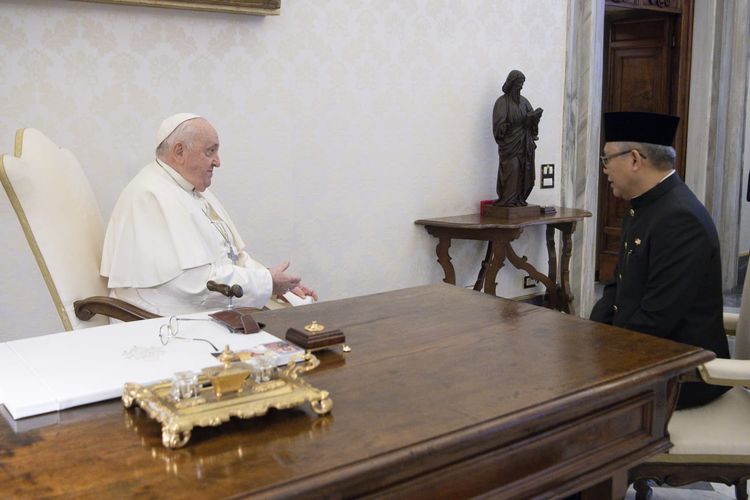Indonesia and the Holy See marked 75 years of diplomatic relations on March 13, commemorating a historic partnership that began with the Vatican’s recognition of Indonesia’s independence in 1947.
The Holy See was one of the first international entities to acknowledge Indonesia’s sovereignty during its early struggle for independence.
On July 6, 1947, the Vatican established the Apostolic Nunciature in Jakarta, setting a precedent for other nations in Europe and the Americas to follow suit.
Diplomatic ties were formally instituted on March 13, 1950, under the status of the Apostolic Internunciature, which was later elevated to an Apostolic Nunciature on Dec. 6, 1966.
The Vatican’s recognition of Indonesian sovereignty under Pope Pius XII was significantly influenced by Bishop Albertus Soegijapranata SJ, the first native Indonesian bishop, whose diplomatic efforts helped garner international support.
On July 6, 1947, Pope Pius XII appointed Bishop Georges-Marie Joseph Hubert Ghislain de Jonghe d’Ardoye as the Apostolic Delegate to Indonesia. He later served as the first Vatican Ambassador to the country.
By appointing Bishop d’Ardoye at a time when Indonesia faced the threat of Dutch re-colonization, “the Vatican unequivocally demonstrated its support for Indonesia’s sovereignty.”
Over the past 75 years, three pontiffs visited Indonesia: Pope Saint Paul VI in 1970, Pope Saint John Paul II in 1989, and Pope Francis in 2024.
Conversely, four Indonesian presidents made official visits to the Vatican:
- President Soekarno in 1956, 1959, and 1964, where he met with Pope Pius XII, Pope Saint John XXIII, and Pope Paul VI;
- President Soeharto in 1972;
- President Abdurrahman Wahid in 2000; and
- President Megawati Soekarnoputri in 2002, 2023, and 2025.
Speaking with LiCAS News, Indonesian Ambassador to the Holy See H.E. Michael Trias Kuncahyono emphasized that the Vatican regarded Indonesia as a distinctive model of peaceful coexistence in a pluralistic society.
He noted that the country’s national ideology, Pancasila, and its motto Bhinneka Tunggal Ika (Unity in Diversity), encapsulated the principle of unity amid diversity.
Pope Francis, during his apostolic visit to Indonesia in September 2024, echoed this recognition. “The Holy See not only appreciates this but also admires it—especially in an era when many countries are divided due to ethnic and religious differences,” the Pope remarked in a speech before then-President Joko Widodo and other dignitaries.
He elaborated, “Your national motto, Bhinneka Tunggal Ika, beautifully describes this diverse reality—a pluralistic society that remains united as one nation. Harmony in diversity requires everyone to embrace the spirit of fraternity in the pursuit of the common good.”
Indonesia recognized the Holy See as a sovereign entity without military power but with significant moral authority and global reach. The Vatican’s diplomacy relied on moral persuasion, theological doctrine, and international legal frameworks.
As of today, at least 1,729 Indonesian religious persons are studying, working, or serving in various monastic communities across Italy. Many nuns are involved in education, elderly care, and orphanage management, while most priests are engaged in academic studies.
Michael Trias Kuncahyono, Indonesian Ambassador to the Holy See, highlighted shared concerns between Indonesia and the Vatican on pressing global issues, including peace, human rights, environmental conservation, and food and water security.
Both entities also advocated for the protection of women’s and children’s rights and actively engaged in promoting diplomacy and dialogue in conflict regions such as Palestine, Yemen, Myanmar, Nigeria, and Ukraine.
On the longstanding Israel-Palestine conflict, Indonesia and the Vatican maintained a unified position, jointly supporting a two-state solution.







